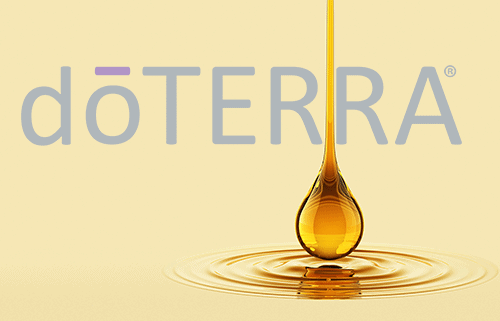
Real, Unbiased doTERRA Review from an Ex-MLMer
36 Comments
Table of Contents
- WTF Are Essential Oils?
- doTERRA: Who Are They?
- How doTERRA Started
- Is doTERRA a Mormon Company?
- Are doTERRA Essential Oils Safe and Organic?
- Pros: Why doTERRA is Good
- Cons: Why doTERRA is Bad
- Compensation Plan: How The doTERRA Business Works
- doTERRA: Quick Summary
- Bottom Line: So is doTERRA a Pyramid Scheme?
- Shameless Plug: Realistic Passive Income Without MLM?
WTF are Essential Oils?
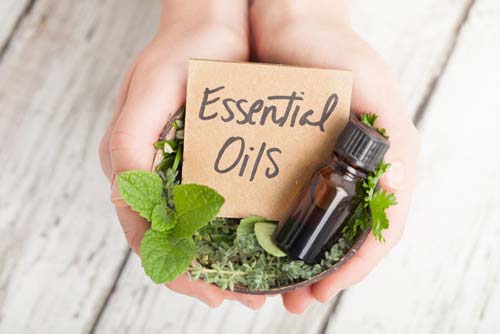
News flash: It’s 2025 and unless you’ve been living under a rock somewhere, you’ve probably heard of the MLM doTERRA.
Or, at the very least, you’ve heard someone mention “essential oils”.
Amiright?
And no silly goose, I’m not talking about the kind from fish or olives.
Or bacon.
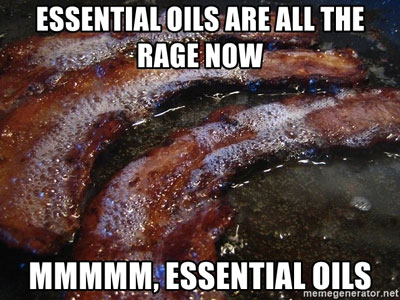
I’m talking about frankincense, tea tree, and peppermint essential oil to name a few.
To some, these plant-derived elixirs represent a cure for everything from anti-aging to the common cold.
To others, they represent an opportunity to start a direct sales business and make some serious bank.
That’s right, essential oils have invaded the MLM space…
Now run for your lives!
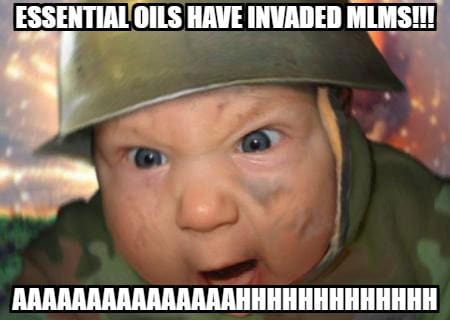
Between word-of-mouth marketing, home parties and full-fledged conferences, essential oils are sellin’ like Glocks at an NRA convention.
And from the looks of things, this “EO mania” isn’t slowing down anytime soon.
Essential oil companies such as doTERRA and Young Living are on an absolute tear in terms of growth and sales.
Even so, the general population still knows very little about essential oils, which means that this market is (amazingly) still in its early stages.
So does this mean that you should sign up as a distributor in 2025?
Y’know, become an Essential Oil Tycoon and get ahead of the curve before the market hits critical mass?
Not so fast, Slick.
So What Exactly Are Essential Oils?
Without getting into the boring technical details, essential oils are basically organic liquid compounds that have been extracted and distilled from plant materials.
The oils capture the fragrance and flavor characteristics (aka “essence”) of a wide variety of flowers, herbs, fruits, etc. which have been shown to have positive health benefits.
Many aromatherapists, naturopaths, and other health-conscious peeps swear by ’em.
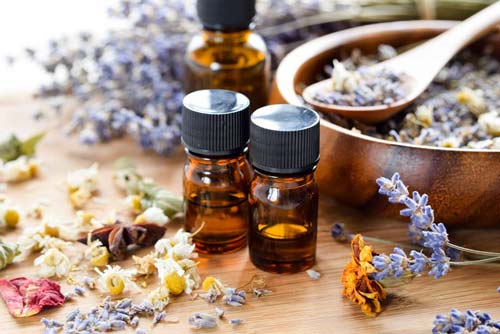
Don’t forget that word-of-mouth is the primary driver behind a company like doTERRA, doing almost TWO BILLION dollars each year.
Fact: In 2020, they were ranked the 15th best MLM (by revenue) on the planet.
For a company that started just over a decade ago, that says a heckuva lot about the high quality of the product.
(And doTERRA’s recruiting strategies.)
But in terms of the business opportunity, you might wanna think twice.
So what exactly am I saying here?
Good question.
Half the time, prob’ly not much.
But there are a few things you need to consider before jumping face-first into a doTERRA business.
For the record: I have nothing against essential oils — I think they’re a fantastic product when used within reason (i.e. they don’t fix or cure everything).
So in the spirit of fairness, I’m not just gonna point out the downside here.
(That would be too easy.)
Instead, I figured it would only be right to provide a detailed review of the doTERRA company as well as the business opportunity.
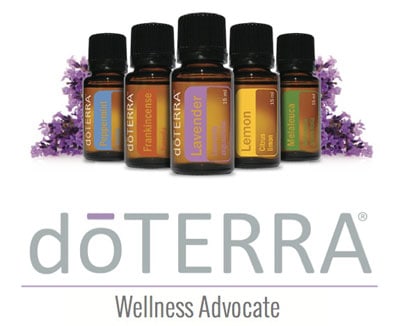
That way, you can hopefully decide — once and for all — if this is a good fit for you or not.
However:
If bacon grease really IS your essential oil of choice, you can safely skip the rest of this article.
Fair ’nuff?
Now, let’s get crackin!
doTERRA: Who Are They?

doTERRA (meaning “gift of the earth” in Latin) produces and distributes a wide variety of health-care and wellness products that contain essential oils.
And they’re pretty damn good at it.
In fact, as of this writing, doTERRA is doing several millions of dollars PER DAY in sales.
This is largely accomplished through their massive network of three million distributors (known as “Wellness Advocates” in doTERRA-speak).
doTERRA also has a robust back-end operation that includes over 1,800 employees and a 383,000-square-foot corporate office and manufacturing center in Pleasant Grove, Utah.

In other words, doTERRA ain’t exactly a humble “mom and pop” operation.
So how exactly did this essential oil empire come to be?
Simple: they were funded by Mexican drug cartels.
Kidding.
How doTERRA Started
doTERRA International, LLC (www.doterra.com) was founded back in 2008 as the brainchild of a team of executives who used to be part of another essential oil MLM called Young Living.
Led by CEO David Stirling, this highly capable and experienced team which includes Corey Lindley, Emily Wright, and Dr. David Hill has been one of the golden keys to the company’s meteoric success.
After spending more hours that I care to admit researching doTERRA, it’s clear that every aspect of the multi-level marketing company’s strategic direction revolves around two main objectives:
- Educating people about the many benefits of using essential oils and promoting a wellness lifestyle.
- Offering an ever-expanding line of EO-related products for their distributors to sell and recruit others into the MLM business.
This strategy has obviously paid off in spades, creating a juggernaut of a company that has experienced ridiculous growth by any standard.
Besides the United States, doTERRA now has offices in 17 countries including Asia, Europe, and Latin America.
And if going from $0 to over $1 billion in sales in just seven short years is any indication, it seems that doTERRA definitely has their sh*t together.
Is doTERRA a Mormon Company?
I get asked this question all the time so looky here:
doTERRA’s headquarters is located in Utah, where approx. 60% of the population are members of the LDS Church aka Mormon Church.
So it makes sense that doTERRA would have some executives and distributors who are Mormons.

But so what?
I’m sure the company also has plenty of Christians, Muslims, and Buddhists on board, as well as many other religions.
And besides, Utah has more MLM companies per person than any U.S. state.
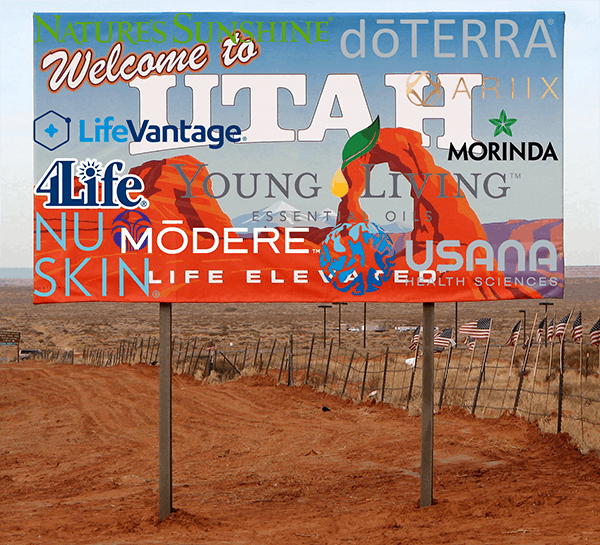
So all of the network marketing companies in Utah probably have more than a few Mormons on board.
The point?
Last time I checked, doTERRA is an essential oils company — not a “Mormon company”.
(Whatever that means.)
Are doTERRA Essential Oils Safe and Organic?

The famous French poet Victor Hugo once said that:
Nothing is more powerful than an idea whose time has come.
That could definitely be said about the idea of incorporating essential oils into everyday health and personal care products.
Today’s consumer is lot savvier these days in terms of doing product research.
Especially with new information about the dangers of various chemicals and artificial ingredients in our foods and household products.
Simply put, folks are starting to seek out more natural, holistic, and safer alternatives for the stuff they consume.
That’s exactly where essential oils come in with a BANG — accompanied by a marching band and a small army of oil-sniffing believers.

Fans of essential oils love the fact that these powerful organic substances are 100% natural and can be incorporated into all kinds of health, wellness, and skin care products.
doTERRA has capitalized on this emerging mega-trend better than anyone.
And we’re not just talking about scented oils that you massage into your skin or diffusing some doTERRA Lavender oil with an aromatherapy diffuser.
(Or add to a nice hot bath.)
It’s an entire product line of EO-laced goodies including shampoo, deodorant, skin cleansers, lotions, nutritional shakes, dietary supplements, etc.
That includes Family Essentials — a collection of some of doTERRA’s most popular oils including Lavender, Lemon, Peppermint, Melaleuca, Oregano, and Frankincense.
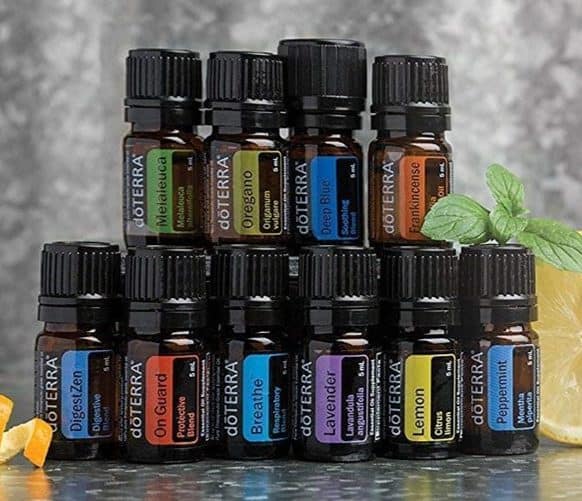
They even have the doTERRA Kid’s Oil Collection — gentle blends that are allegedly safe enough for young children of all ages.
And for what it’s worth, doTERRA’s products seem to have mostly high ratings on Amazon.
Are doTERRA Essential Oils FDA Approved?
Well, it depends on how they’re marketed.
According to the FDA, essential oils are classified as “aromatherapy” products which are regulated based on their intended use, advertising claims, and what customers are told to expect from using the product.
One of the biggest selling points for doTERRA products is centered around their very own “Certified Pure Therapeutic Grade” (CPTG) testing process:
Without an accepted standard for essential oil quality, doTERRA created its own testing process, calling it CPTG Certified Pure Therapeutic Grade®. The CPTG process certifies that there are no added fillers, synthetic ingredients, or harmful contaminants in their essential oils that would reduce their efficacy. doTERRA even goes a step further, putting all their products and the packaging through a battery of tests to ensure a long and effective shelf-life. This protocol ensures potency, purity, and consistency batch to batch.
Sounds good, right?
But there’s also quite a bit of controversy surrounding therapeutic grade essential oils.
Back in 2014, the U.S. Food and Drug Administration (FDA) sent letters to three health & wellness companies including doTERRA and Young Living.
It was basically a stern warning against anyone who was promoting products and making outrageous (and unproven) medical claims.
Such claims included that some essential oils could “cure” a variety of illnesses including cancer, autism, Alzheimer’s, and even the deadly Ebola virus.
To be fair, doTERRA quickly made changes to its FDA compliance guidelines and came up with an extensive list of do’s and don’ts for its distributors.
That included a strict policy for Wellness Advocates to not make any more claims towards specific illnesses or use words such as “illness, cure, disease, treat, etc.”
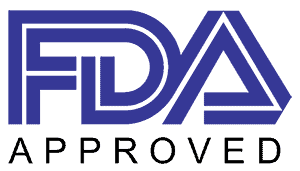
They could, however, make FDA-approved claims such as talk about the mood or skin-enhancing effects of essential oils, and use words such as “wellness, health, etc.”
Claims that certain products can help the body function normally and support the immune system are also permitted.
For example, this would be an acceptable FDA-approved statement:
With doTERRA’s impressive range of products, you can spray, rub, inhale, and even ingest various essential oils to help remedy certain ailments, or to promote better overall health in general.
But all this controversy has definitely given fuel to the doTERRA haters who basically think the company and their products are a complete scam.
Which is fine — everyone’s entitled to their own opinion.
Speaking of which:
I’m not a fan of the MLM business model, but I’ve personally experienced the benefits of essential oils from both my yoga studio and massage therapist.
So there’s always two sides to every coin.
Just make sure you take ’em both into account before making up your own mind.
Pros: Why doTERRA is Good
✓ For all of its folklore-like reputation, essential oil usage is being validated by scientific research more and more every day.
This makes a compelling case for using products such as those offered by doTERRA.
✓ Essential oils are highly versatile, which means they have a ton of different potential uses for everyday life.
So what does this mean for a doTERRA distributor?
More opportunities for sales on new products that are highly consumable and encourage repeat purchases.
That’s called residual income, babycakes.
✓ The trend towards natural/organic/holistic health and wellness practices continues to gain momentum.
More and more “ordinary” folks discover the power of essential oils every single year.
Which spells “opportunity” for people who promote products that cater to this trend.
✓ The support system that doTERRA has established for their Wellness Advocates is outstanding.
The company offers free articles and training videos that are part of an online “University” for all things doTERRA.
This includes a lot of product education and useful business building tools to help distributors build their businesses.
✓ Unlike many of the other MLM companies out there, doTERRA’s corporate conferences seem to be run with a high degree of professionalism.
It’s hard to find a popular MLM conference (e.g. Amway) that doesn’t suffer from some degree of cult-like behavior or redundant rah-rah groupthink.
However, doTERRA manages to avoid some of the shadier aspects of these types of events.
✓ The market for these types of products is virtually unlimited.
It’s not geography-specific, as can be evidenced by the fact that the company now ships to over a hundred different countries.
✓ The versatility of the products is a huge plus.
A “go-getter” type of distributor could easily host home parties or workshops to teach various uses of the products.
This would not only leverage their time but also allow them to make more sales.
✓ The company offers a “Fast Start Bonus”.
Distributors who sign up new referrals will receive a 20% commission on the sales volume of the new recruit for the first 60 days.
✓ You can earn free products through their Loyalty Rewards Program.
✓ doTERRA Healing Hands is the company’s charitable organization which:
Seeks to bring healing and hope to the world, for lives free of disease and poverty, and to ultimately empower impoverished communities with the tools needed to become self-reliant.
Any charity is always better than zero charity in my book.
Cons: Why doTERRA is Bad
✗ There is a $35 one-time enrollment to sign up as a doTERRA distributor and like all MLMs, you will be highly encouraged to build a downline of distributors below you (aka recruiting your family and friends) to make commissions and bonuses off of their sales.
Which is fine if that’s your thing.
Just not for me.
✗ The company does not have any exclusive oils that they can call their own.
In other words, doTERRA basically obtains their oils from external suppliers.
To be fair, though, they do offer a line of proprietary essential oil blends (e.g. doTERRA On Guard), which are basically a mixture of two or more different types of essential oils.
✗ This one is a controversial issue that has ruffled more than a few doTERRA feathers.
Unlike their primary competitor Young Living, doTERRA does not own or operate their own farms where they can grow the plants from which the essential oils are derived.
Many doTERRA fans have wondered why I think this is a Con instead of a Pro.
Any time you don’t own something, your ability to call the shots is always gonna be diminished which makes it more difficult to maintain the same quality standards.
To be fair, doTERRA has their Co-Impact Sourcing program as well as their Source To You website which allows you to verify the specific batch quality of the plants and doTERRA oils you’ve purchased.
Here’s the best video I could find that explains the main differences between doTERRA and Young Living’s farming approach:
Long story short, whichever approach you think is better completely depends on your point of view.
Both companies have their own way of doing things, and it’s clear that each have excellent systems in place to produce the highest quality oils.
As always, make up your own mind.
✗ They’ve had some issues with the FDA dealing with unproven medical claims.
As previously discussed here, doTERRA received a letter from the FDA warning against their distributors making false and misleading product claims.
This was caused by several Wellness Advocates posting on social media that doTERRA’s oils could even “cure” deadly viruses like Ebola lol.
To help compensate for this, they now enforce a strict, FDA-approved compliance policy that all Wellness Advocates must adhere by.
✗ The retail pricing on their products is a little on the steep side.
This is one of my biggest gripes with the majority of MLMs out there today — the products are typically not competitively priced.
A lot of this has to do with ensuring that distributors hit certain monthly volume requirements to keep those commission checks rolling in.
This can be a difficult hurdle to overcome for the fledgling distributor who is just starting out.
Especially since they usually have to lay out a lotta cash every month before their business reaches any real level of profitability.
Compensation Plan: How The doTERRA Business Works
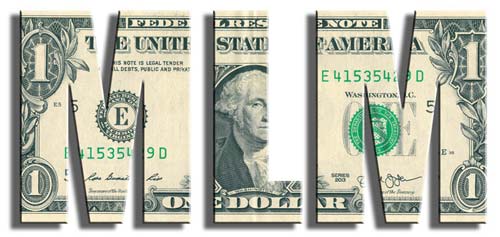
Okay, now we’re down to the good stuff: Cheddar.
Y’know, Benjamins. Fat stacks. Dead presidents. Cash money.
Part of me says that if you’ve seen one MLM compensation plan, you’ve pretty much seen ’em all.
This pretty much applies to doTERRA’s compensation plan as well — it’s nothing really out of the ordinary but there are a couple of features that I would like to point out.
First of all, you have to decide whether you want to sign up as a Wholesale Customer or Wellness Advocate.
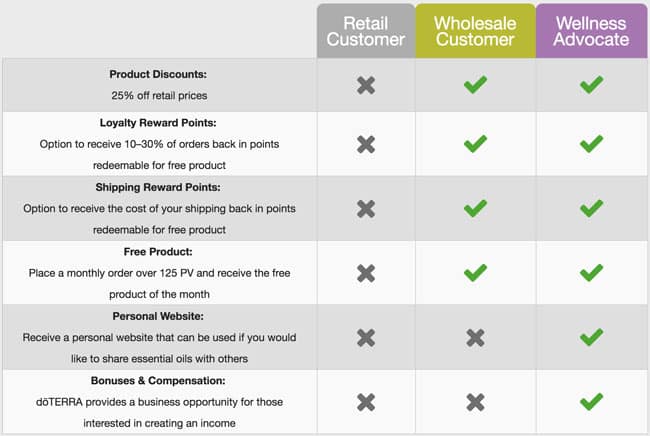
So the main difference is:
As a doTERRA Wellness Advocate, you get a personalized website and also what’s known as the Fast Start Bonus.
Which basically means you’ll receive a 20% commission on any orders placed by your new enrollees for the first 60 days after you signed them up.
The trick is that you have to be doing at least 100 PV (Point Value) on your own Loyalty Rewards Order before you can qualify for this bonus.
In other words, there’s no free lunch — you gotta have some skin in the game as well.
Speaking of Point Value, this is one of the biggest beefs I have with network marketing companies.
In most MLMs, you’ll hardly ever see a 1:1 ratio of PV to dollar value on any of the products that you purchase.
Instead, the PV is often quite small compared to the amount of money you have to lay out to buy the products.
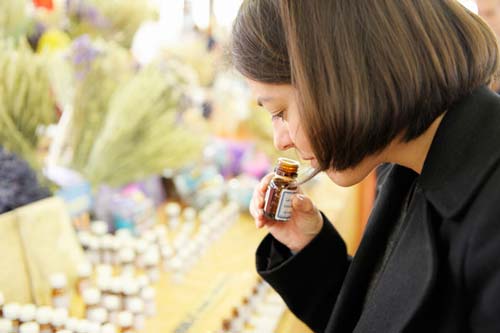
But check this out:
doTERRA is a refreshing exception to this rule with most of their essential oil products having an equal PV to dollar value.
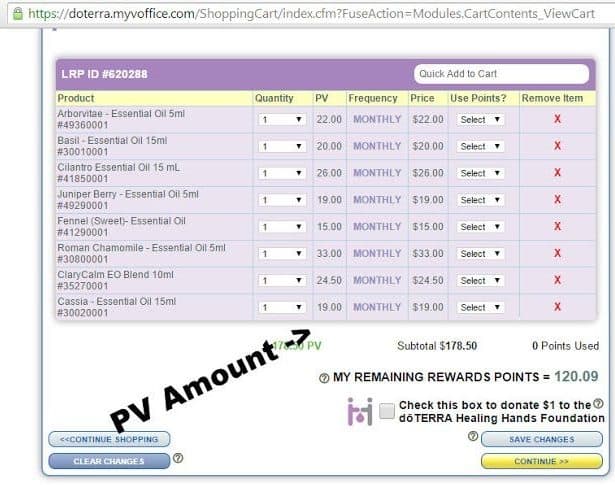
Still, I’m not fan of doTERRA’s overinflated MLM prices.
For example, their Natural Deodorant costs nearly $9 wholesale (almost $12 retail!) for a measly 1.7 oz stick of deodorant, but you only get 5 PV for the purchase.
Compare that to the average store-bought deodorant which normally costs around $4-$5 for 2.7 oz.
See for yourself right here.
This underscores not only their inflated product prices, but the fact that you’re really gonna have to fork over some cash to build up any decent PV.
For the average Joe trying to build a business from scratch, it’s hard to justify paying 9 bucks for a tiny stick of deodorant just to help boost your PV count.
Yes, you want to “be your own best customer” and all that jazz.
But at the end of the day, you just paid about twice as much as you would have for a larger comparable product that can be found in any nearby supermarket or drugstore.
And you barely got any PV to show for it.
I agree that you get what you pay for in life, but still not the wisest move if you ask me.
Back to the compensation plan.
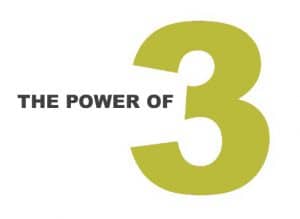
The company also offers a “Power of 3” incentive program.
Which is basically designed to help distributors focus on building the proper structure in their organization.
Long story short, you get extra money when you sponsor 3 people who enroll in the Loyalty Rewards Program.
Then they each sponsor 3 people who do the same thing, etc.
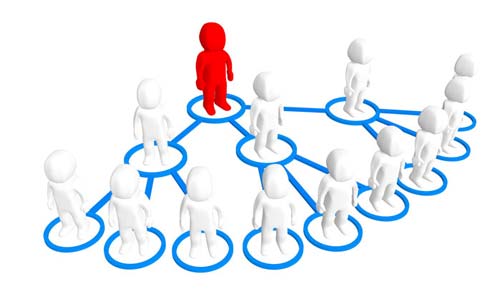
I guess to infinity.
When (or if) you finally have three personally sponsored distributors doing 100 PV per month and your total Team Volume crosses the 600 PV line…
You will qualify for a $50 bonus on top of your regular commission check.
As can be expected, the bonus amounts will increase as the size of your organization increases.
As you get into the more advanced stages, you will be encouraged to go beyond the Power of 3 and actually build to the Power of 4.
This will come in handy just in case one of your enrollees in the Power of 3 structure forgets or fails to place their Loyalty Rewards order for the month.
doTERRA: Quick Summary
| PROS | CONS |
|---|---|
| Essential oil usage is being studied and validated by actual scientific research seemingly more every year. | There is a $35 one-time enrollment to sign up as a distributor but the real money comes from recruiting a team of distributors below you. |
| Essential oils are highly versatile and the trend towards natural, organic, and holistic health and wellness practices continues to gain momentum among consumers. | doTERRA does not own or operate their own farms where they can grow the plants from which the essential oils are derived. |
| The support system that doTERRA has established for their distributors (a.k.a. “Wellness Advocates”) is outstanding and their corporate conferences are run with a high degree of professionalism. | The company does not have any exclusive oils that they can call their own; they basically obtain their oils from external suppliers. |
| The company has a charitable foundation called doTERRA Healing Hands which helps communities in need around the world. | doTERRA has received a written warning from the FDA who did not like how some Wellness Advocates were making unproven medical claims. |
| doTERRA offers a “Fast Start Bonus” and you can earn free products through their Loyalty Rewards Program. | In my opinion, the retail pricing on their products is a little on the steep side for what you actually get. |
So is doTERRA a Pyramid Scheme?
No, it’s not a pyramid scheme.
But realistically, can money be made with doTERRA in 2025?
Well, if their yearly revenue figures are any indication, it’s safe to say there’s a TON of sales volume to be captured by slangin’ essential oil products.
It’s not all roses though.
Like most other MLM opportunities, it’s probably gonna take quite a bit of upfront investment before you begin to move the needle in terms of profitability.
The good news is that this company is poised to take advantage of a major shift in consumer sentiment towards more natural and holistic health and personal care products.
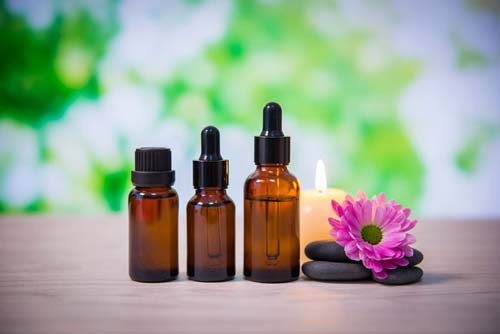
Add to that the fact that essential oils are still unfamiliar territory to the average consumer.
Now you have a recipe for a significant opportunity for an aspiring entrepreneur.
That said, I hesitate to personally recommend doTERRA because of the somewhat ridiculous prices of their products.
Bottom line?
I don’t think it’s a scam but do think that it will take the average distributor a long-ass time to see a significant return on their investment.
This is far from a novel concept — according to the FTC, less than 1% of those who get involved with network marketing actually achieve profitability.
Along with the abysmal failure rate, who really wants to spend time hitting up their friends and family to build a business?
But that’s just me.
There are obviously many successful entrepreneurs in doTERRA who believe they’re selling great products and have genuinely good intentions.
So make up your own mind.
If you’re interested in a different way to make money from home — one that doesn’t involve making you feel like a desperate stalker — you can find out all about it right here.
Shameless Plug: Realistic Passive Income Without MLM?
Imagine this:
No recruiting, no selling products, no rah-rah meetings, no bullsh*t.
Don’t believe me?
Don’t blame you.

But before you scream “SCAM!” and scram, do yourself a favor.
Put down the Hatorade and click here to discover more realistic ways to make passive income from home.
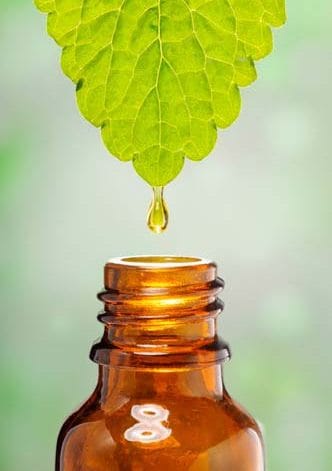
Oh mah god, best blog ever ! You’re the god of words !
Also, great post. And thank you for taking the time to investigate this company, saved me a few clicks.
Lol thanks for your comment Ella 🙂 Glad my review helped you out.
Thanks for your honest review of doTERRA. I’ve used their products for a year, and I am impressed with the quality of the products and the company. They are not the right thing for everyone, and their business model is also not for everyone.
I’ve been a “Wellness Advocate” for a few months, and it is hard to “build a business”, especially since I only want to “enroll” people who are as interested as I am, who see a need or a place for these products in their lives, and really want them.
Mostly I experience health benefits from them, and I love sharing what I have experienced – so my family, friends and coworkers get lots of freebies from me! Maybe some will “sign up”, maybe not. I try to stay in the mindset that the goal is to help people out, not make a paycheck.
Thanks for letting me share some of my thoughts about being part of doTERRA, and again, thanks for your honest review.
Thanks for the comment, Wendy! I appreciate you sharing your doTERRA experience.
I am a Wellness Advocate and I enjoyed your article. It was an honest look at the company.
The only place where I would add input, would be the PV section where you stated “You will hardly ever see a 1:1 ratio of PV to dollar value on any of the products that you purchase.”
The oils are almost all (if not all) a 1:1 ratio. And the oils are why we are here, right?
So, if you are ordering oils, you can use your points to get items that don’t have the 1:1 value for free.
Other than that, it gave great insight. Thank you.
Thanks for your comment, Jill!
Regarding the PV value:
I was referring to “most” MLM companies but I’ve updated my article for clarification 🙂
I currently work as a Wellness Advocate for doTERRA and was just doing some research and came across this blog and was very impressed.
This guy doesn’t sugarcoat it and has sound arguments for both ends which is rare in today’s internet.
Want to thank the author for putting in the time and will be sharing this with my down line. I found it insightful and tactful.
People need to know what they are investing in and decide for themselves if its what they want.
Thanks Jason. These articles take me an ungodly amount of time to put together and I really try to show both sides, so I’m glad it’s appreciated man 🙂
Great Blog! Thanks for your work and your words ….. and your sense of humor. I am in doTerra, now. I am in it strictly for my own use – and I LOVE what I do use. Perhaps, futher down the line – more will be revealed. I can sell most anything but I am uncomfortable with the MLM model. So there is that. Any hooo Thanks!
Thanks for your kind words Lucy!
I am curious why you think that not owning their own farms is a CON for doTERRA. They have put into place a co-impact sourcing program that has given jobs to thousands of people in economically poor regions of the world and in turn have gotten proprietary oils that are pure and therapeutic.
To me, this is a PRO because they are giving back and lifting people up all over the world and getting the highest quality oils available. Also, from what I have been able to experience, doTERRA oils are less expensive than Young Living oils and with doTERRA you have many opportunities to receive free products when you purchase on a regular basis (LRP).
I have been able to earn enough to pay for my oils on a monthly basis. While there is an initial $35 fee, if you purchase a kit you get discounted prices and the $35 is waived. Renewal fee is $25 and you get a free bottle of peppermint. No brainer to me.
Hey Kathy, thanks for the comment! You bring up some good points about doTERRA’s Co-Impact Sourcing program, which definitely has some upsides. I still think the company would be better off owning the farms outright, just to ensure their high standards are being met. But I’m glad to hear doTERRA is working out for you.
Hey Simon! Great review!
Like all things in life it’s hard to have a full scope of something unless your apart of it. The deodorant prices might be a little off, most quality natural deodorants are pricey.
As for a company owning their own farms, this would be very hard to do and have quality products, even the ones that say they do only account for less then 5% of their oil production.
When you harvest something that grows in its natural environment the potency of that product it far greater then a farmed product. Like blueberries, a wild blueberry has double the antioxidants as farmed.
dōTERRA also proves their quality by the vast testing they do on every batch of oil, and publish the results for the public to see, there isn’t many companies that are this transparent, no other major essential oil company does this.
Thanks Simon! I’ll be following your reviews, love your perspective!
Thanks Brad, I appreciate your input 🙂 Glad you enjoyed the post!
I’ll start with, I really appreciated this review. Great work. I second a lot of the great compliments you’ve received about it.
One Pro I think is you don’t have to spend every month. Not a requirement unless you want commission and each month you can compare how much you would ‘save’ on oils and whether worth it.
I don’t “sell” Doterra often, I never hounded my friends or family but I’ve been using the products and I have to say, I’m getting more and more convinced about the oils and wanting to sell them. My family members have been asking ME about them because they really are just incredible.
Lastly, unsure if statistic about less than 1% being unprofitable paints an accurate pic, just because the numbers are greatly skewed by huge % of “distributors“ being interested in discounts, not profitability.
Thanks for your comment, Julia 🙂 Your feedback is greatly appreciated!
Good blog and straight to the point as others said.
No matter how it’s sugarcoated, hounding friends and fam is just not for me. Someone close has gotten into this and I feel compelled to research this further.
Personally, many oil fragrances are just not needed especially the strong ones.
If the urge got to me I would buy generic as it’s essentially the same thing without the fancy packaging.
Thanks for your comment JJ 👍
I bought into doTerra with the sole purpose of being a member. I was disillusioned rather quickly. I have suffered from migraines for 21 years and was desperately looking for a natural alternative. Well-meaning people recommended oils, so l tried them for a while.
I went through the daily routine and the extra routine at the on set of migraines and to no avail. I ended up at the er very sick. I am happy for those that have found relief.
My frustration came from the lady who was my sponsor/teacher. She said l had to give it more time and buy another oil in the list to treat the migraines. I had already spent over $300 to start! We are of average income.
My experience was not positive except l do enjoy some of the scents. Thanks for the clarity. I’m not a pushy person either. I wouldn’t have been able to sell.
Thanks for sharing your experience Lisa 🙂
I have a relative that is a distributor for this company. She tried to sign me up. Unfortunately I am too busy with my own hustle selling rice krispies vs oils.
I also think this can be a dangerous process in the making. Unless one is a Certified Aromatherapist, and other certified Homeopathic clinician people should not be out there selling this. You have no idea about someone’s current or past health history.
This stuff can get in their system and cause reactions they may not even know until something happens. Then you’re in the clink clink for attempted whatever. No thanks.
PS. Great article though!
Ang
Thanks for your comment, Ang! While I agree that folks need to be careful about how they use essential oils, I think they’re pretty safe overall.
And I haven’t heard of any doTERRA or Young Living distributors getting locked up for “attempted whatever” yet 😉
Thank you for this review and summary! I found this very insightful, as I am trying to learn about EO’s and contemplating purchasing a Doterra kit, but I really didn’t understand the broader MLM component of the company from the meeting I attended.
I am not even sure if the ‘wellness advocates’ I met had the full picture as you have described. This is excellent. It was very helpful to see your balanced break down of pros and cons.
Thanks so much!
Shannon
Awesome 🙂 Thanks for your comment, Shannon! Happy to help.
Like all MLMs, I have an educated suspicion that they have nothing to do with quality product and everything to do with recruiting more worker bees.
Companies claim all sorts of things about their products and more and more these claims are being found to be fraudulent.
Don’t know if this is the case with Doterra, but the immoral nature of the business model is enough to put me off.
Hey Lisa, thanks for your comment! I have similar feelings about the MLM industry (absolutely hate recruiting) but some companies do actually have high quality products 👍
Hi Simon-
Really loved your insight and fairness on this post. I really have nothing more to add from the Wellness Advocate standpoint, (as this is what I am with doTERRA).
Just wanted to say Great Job Researching!
Respectfully yours,
Maria Ricci
Thanks Maria 🙂
Hey Simon, great review! So I was wondering what brand of essential oils do you use, then?
Thanks Kristina! Personally, I don’t actually use essential oils.
But my yoga studio uses doTERRA and my massage therapist is a fan of Young Living.
So I don’t think you can go wrong with either brand. It’s just a matter of personal preference 🙂
A big thank you for your no nonsense and objective analysis of doTerra. It has helped me to make an informed decision.
You’re welcome, Edwin! Glad to hear it 👍
Omg, what a great article, decent and honest and to the point. Where did you learn the skills? I’m jealous already.
Thanks Magda 🙂 I enjoy researching and writing about these companies so I’ve learned mostly through experience i.e. writing a LOT!
The best layout and design of a blog article I’ve ever seen. Came for the preview, stayed for the graphics 😎
Great stuff !
Thanks Alex, much appreciated man 🙂